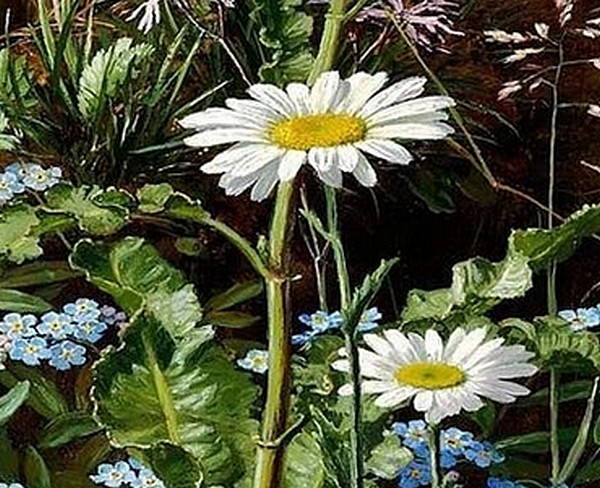Dog roses, forget-me-nots, daisies, buttercups and clover - Otto Ottesen (fragment)
First post just published on the new website (remember last week we said goodbye to Blogger. If you come across something that doesn't work properly, please let me know asap!). To celebrate this new era, we are dedicating this post to Art Song. I can hear you saying: “Of course we are, as always!” Yes, but this time with a difference: today we are listening to the voices of composers, poets and experts through ten quotes.
First quote is a definition of Art Song compared to opera:
1) If opera is intoxication, with its rituals and curtains, art song is mystery, nothing but a blind listening
(André Tubeuf - Le Lied. Poètes et paysages)
About the performers, and also about the audience:
2) In art song, it is essential to explain both, music and lyrics.
(Josep M. Ainaud de Lasarte, a Conxita Badia no existeix)
3) The interpreter must start with four possessions: perfected technique, magnetism, sense of atmosphere and command of tone-color.
(H. Plumket Greene - Interpretation in Song)
4) The public must be sure to go in order to listen to the songs and not just to hear a voice. And singers and teachers must show complete integrity for the composer's intentions and not indulge in improvised “editing” just to get an isolated effect.
(Sidney Northcote - Byrd to Britten)
And composers, what do they think about writing songs?
5) [writing songs] is really the most difficult and what more skill and knowledge requires: to pour into a small form a big content.
(Gustav Mahler - Erinnerungen an Gustav Mahler , Natalie Bauer-Lechner)
The relationship between poets and composers have always been pretty difficult. Some poets longed for their poems to be transformed into songs. Wilhelm Müller, for instance, who died unaware that Schubert had composed
Die schöne Müllerin and
Winterreise.
6) My poems enjoy only half a life: a paper existence in black and white, until music awakens and animates them with a breath of life.
(Letter from Wilhelm Müller to Bernhard Josef Klein)
Other poets, like Victor Hugo, were not at all in favour of songs:
7) Nothing irritates me as much as that stubbornness in turning beautiful verses into music. Musicians have an unfinished art, so they have some fixation in completing poetry, which is a complete art.
(Victor Hugo - Tas de pierres)
Composers, of course, see in a different way the relationship between poetry and music:
8) Both may excel apart, but are most excellent when joined, for they appear like wit and beauty in the same person.
(Henry Purcell, at the prelude of Prophetess, or The History of Dioclesian)
Other composers split hairs and state that it depends on the poem (I was unable to find the quotation reference, perhaps you know it and would be kind enough to share it with us):
9) A perfect Goethe poem doesn’t need any music; precisely in the case of Goethe, music weakens and flattens out the word.
(Richard Strauss)
Last quote is a Lied. Hugo Wolf chose it to open his collection of Italian songs,
Italienisches Liederbuch. A poem that is a statement of principles in itself; the first two verses are:
Even little things can delight us,
Even little things can be precious.
The poem is included in
Canti popolari toscani, corsi, illirici, greci, raccolti ed illustrati da Niccolò Tommaseo, and Wolf makes use of Paul Heyse's translation We are going to lisent to the Lied performed by Mojca Erdmann and Gerold Huber.
Auch kleine Dinge
Auch kleine Dinge können uns entzücken,
Auch kleine Dinge können teuer sein.
Bedenkt, wie gern wir uns mit Perlen schmücken;
Sie werden schwer bezahlt und sind nur klein.
Bedenkt, wie klein ist die Olivenfrucht,
Und wird um ihre Güte doch gesucht.
Denkt an die Rose nur, wie klein sie ist,
Und duftet doch so lieblich, wie ihr wißt.
Even little things can delight us,
Even little things can be precious.
Think how we gladly adorn ourselves with pearls;
They are heavily paid for, and yet are small.
Think how small is the olive's fruit,
And is nevertheless sought for its virtue.
Think only on the rose, how small she is,
And yet, smells so sweet, as you know.
(translation by Donna Breitzer)
















Comments powered by CComment